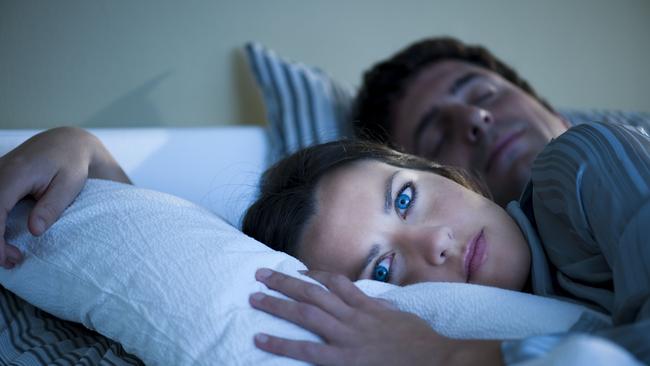Remember the good old days? You must be dreaming
Researchers are looking at our sleep to see how we’re coping with COVID-19.

World over, it seems that people are dreaming more often, and more vividly, than before COVID-19. To the delight of sleep and dream researchers, they are also remembering their dreams, and reporting them:
“I found a body in a small cupboard. I tried telling my friend about it, but she ignored me.”
“It was a rural landscape, and there were eyeballs rolling across the grass and dirt.”
“I was living in a cabin without electricity or running water, in the prairie.”
These are just some of the thousands of dreams that are being collected as teams of academics across the globe set about doing as Nabokov did for 80 days in 1964: tracking and cataloguing not their own but everyone’s dreams in an attempt to divine what, if anything, they mean, as we tackle this crisis together.
But are we dreaming more vividly than we were before COVID-19? Perhaps we are simply remembering our dreams or reporting them more widely?
To answer those questions, we need to go back. Back to sleep, in fact.
Moira Junge, who is a board member of Melbourne’s Sleep Health Foundation, a research associate at Monash University and host of the SleepTalk podcast, says we must take into account that many of us simply are getting more sleep.
“More sleep equals more dreams,” she says. “The flipside, if anxiety is associated with those dreams, we are more likely to wake. If we wake, we are more likely to remember that we were dreaming and so we are all talking about dreams. And I love talking about sleep, and about dreams.
“Even the word dreams, when you think about the dreams in our language, it’s hopeful. What do you dream about? What do you hope for? For sleep researchers, this is a wonderful time.”
Junge, along with Melinda Jackson of the school of psychological sciences at Monash University and two PhD candidates, Hailey Meaklim and Prerna Varma, jumped right into the opportunity for new research. Their project, Insomnia in the time of COVID-19, will examine the impact of the pandemic on sleep behaviour. They are seeking adults, aged 18 and older, to complete a survey and a sleep diary, investigating the impact of COVID-19 and self-isolation on sleep, mood and daily routines. As part of that, they hope to capture some thoughts about dreams.
“There are so many people talking about it, my own family, myself included,” Junge says.
“I am a psychologist, and one of my specialist areas is sleep. Probably half my clients have terrible sleep, and I reached out to many of them in early March, when the world first turned upside down, because I was very worried about them.
“And some of them actually reported better sleep. Quite wonderful dreams. Some of my clients with debilitating sleep issues — about six in one week — were sleeping so much better. And anecdotally perhaps we can say, if people have been feeling quite overwhelmed by the pace of life, or by politics in the workplace; if they have secure employment and they quite like being home, their sleep may be improved and they may be dreaming more vividly.
“But we are also all feeling anxious. We’re all looking out for each other, but also suspicious of each other. Walking this morning, I saw somebody who pulled her jumper up right over her face as she passed by me. There is aggression in supermarkets. And anxiety is what causes us to wake from the dream, and the waking causes us to remember.”
Junge has experienced unusually vivid dreams during COVID-19, and when she asked her family at the dinner table, they said they had all experienced “increased dream content, and sometimes quite bizarre. My daughter told me: ‘I dreamed I asked you if I could have three piercings, and you said yes!’ ”
That’s a nice dream — perhaps even a happy fantasy! — but sometimes the fear we nurse during waking hours can become a nightmare. One longstanding study, from the Lyons Neuroscience Research Centre in France, suggests the coronavirus pandemic has caused a 35 per cent increase in dream recall among participants.
Frequent awakenings, also called parasomnias, see many waking in fright. If that’s you, there are things you can do about it.
“One strategy we use is to change the ending of a recurrent nightmare, while the person is awake,” says Junge.
“One kindergarten teacher was having horrible dreams, over and again, that all the kids would get out, spilling on to the road, and she wouldn’t be able to keep them safe, and her therapy was practising changing the end, so even if they did get out, the gates are locked, there are people on the crossing, if you’re able to visualise that, you can reduce the burden of the dream.”
Denholm Aspy is an Adelaide-based scientist with a special interest in lucid dreaming, “which is when you know you’re dreaming even as you are still in the dream, and sometimes, you can control the dream”.
“At least 25 per cent of people have had one lucid dream in their lives,” he says. “Mostly later in the night, toward the morning. We can have dreams at any point, and they last about 90 minutes for the average person, but most people will have about 50 per cent of their dreams in the final two hours of sleep, the state that is most similar to being awake.”
In the main, he says, “lucid dreams tend to be pleasant, and a wonderful experience. When you become lucid in a nightmare, it helps, too, because you know that you are dreaming, and you can control the dream.”
He says the lucid dreams may be occurring more often during COVID-19 “because they help us to process our emotions” and we are all grasping for some sense of control over the world around us.
Aspy is unsurprised by reports that people are having very similar dreams, “because this a whole global experience. The entire human population is thinking about COVID-19; it’s only natural that we would dream about it, too.”
He’s cautious about applying meaning to dreams “because this is affecting everyone differently. Some people are in denial. Some are panic-buying. Some are depressed and some are manically building home offices as a way to cope, for example.
“We are dealing with a lot of loss: health, loved ones, structures, social contact, job security. We’re having to learn new skills very quickly. People are having to process grief, and loss, and uncertainty. And dream interpretation is one-on-one. You may have similar elements — a snake, for example — but that can be a symbol of one very negative thing for one person and something else entirely for another person.
“From that point of view, I think it’s such an interesting time to do dream research.
“There are theories as to why we dream — to manage emotions, to consolidate memories — and this global research, this shared event, will help boost our confidence in our conclusions as to why people dream.”
Aspy reports a “fantastic lucid dream” the night before we talk.
“It was doing martial artists’ training,” he says. “And I found a temple. And I was trying to get inside. And I did get in. And that made me feel very confident and fulfilled within myself. And I can now think about what that means. But the answer will be different for everyone.”
Carmel Harrington, who is the managing director at Sleep For Health, a research fellow at Children’s Hospital Westmead, and the author of The Sleep Diet, says the COVID-19 crisis presents “a situation that is fairly unique. For the first time in history, we are all, as human beings, experiencing the same thing. And there is anecdotal evidence that many of us are dreaming the same dreams, or dreaming of old places, and old things. And we don’t yet know why. We don’t really know why we dream! But one theory is that when we dream, we are bedding down information.”
It could be, with so much extra sleep, and not much in the way of extra stimulus, if we are staying home and not seeing people, our minds are being forced to draw on memories, in our dreams.
“We don’t exactly know,” says Harrington, “but what we believe happens is, the information we are presented with during the day is bedded down at night.
“The process is complicated: we have to move memory from hippocampus to the rest of the brain, and it seems that we use a filing system, and right now many of us are doing things during the day that we haven’t done since childhood.
“In my neighbourhood, I’ve seen mums and dads out with the children, riding bikes, kicking the ball around, absolutely beautiful scenes. I’ve thought, it looks like Pleasantville, you wouldn’t know something dreadful is out there. And it could be, when we go to bed, as we seek to process these experiences, we reach for that file.”
Into that part of the mind you go, and there you’ll find your childhood, and your parents, and all the people you once knew and perhaps thought you’d forgotten. Try not to be alarmed. This is most likely your mind trying to help you make sense of the morass in which we find ourselves, by memory, and by moonlight.




Have you been sleeping and, if so, are you dreaming and are your dreams more vivid than before? Do you find yourself returning, in your dreams, to places you once lived? Have you marvelled at all the faces you thought you’d forgotten? Or do you feel panicked and afraid?